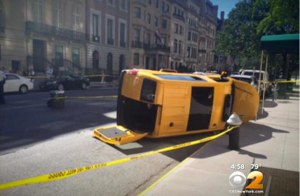The TLC Has Never Used Cooper’s Law to Permanently Revoke a TLC License
In the 18 months it has been on the books, the Taxi and Limousine Commission has never used Cooper’s Law to permanently revoke the TLC license of a cab driver for hurting or killing someone.

Cooper’s Law, which took effect in September 2014, allows the TLC to suspend the TLC licenses of cab drivers involved in crashes that result in death or critical injury. If a TLC licensee is convicted of a traffic violation or crime for causing such a crash, the law requires the agency to revoke that person’s TLC license.
The law was named after 9-year-old Cooper Stock, who was killed on the Upper West Side in January 2014 by a yellow cab driver who failed to yield. Cooper’s Law was one of several traffic safety measures adopted to advance Mayor de Blasio’s Vision Zero initiative.
“On the whole our drivers are safe,” TLC Commissioner Meera Joshi said at the mayor’s Vision Zero bill signing ceremony, “but there are a few bad apples and we need to remove them.”
That isn’t happening — at least under the aegis of Cooper’s Law.
Vision Zero transparency laws do not require the TLC to publish data on what happens after the agency suspends the TLC license of a driver who hurts or kills someone. Streetsblog filed a freedom of information request in February after several unsuccessful attempts to obtain data on case outcomes from the TLC. We received the agency’s response earlier this week.
“There have been no TLC licensees that have had their license permanently revoked for injuring or killing a pedestrian or cyclist pursuant to Cooper’s Law,” the TLC legal affairs office wrote.
TLC-licensed drivers have been involved in at least 15 collisions that killed 16 pedestrians and cyclists since Cooper’s Law took effect, according to crash data tracked by Streetsblog. Based on police and media accounts, of those 16 victims, at least eight are believed or known to have had the right of way. Three victims were on sidewalks, two victims were killed by cab drivers who were backing into crosswalks, and three were hit by cab drivers making turns.
NYPD and city DAs are known to have filed charges for just two of those 15 fatal crashes. One driver was charged with manslaughter for fatally striking Tierre Clark and Kadeem Brown on a Bronx sidewalk. The other was charged under the Right of Way Law for killing Luisa Rosario in a Manhattan crosswalk. Both cases are still pending.
For the TLC to apply Cooper’s Law, NYPD and district attorneys must issue summonses or bring charges against cab drivers who hurt people. Since penalties stemming from serious motor vehicle crashes are rare in New York City, even when victims have the right of way, the number of cases where Cooper’s Law can be used is limited.
TLC-licensed drivers were involved in 35 crashes that resulted in critical injury or death in 2015, according to agency data, resulting in TLC license suspensions for 12 cab drivers. It’s unknown how many, if any, of those drivers were charged with a crime or a traffic violation. But we now know the TLC didn’t revoke anyone’s license to drive a cab.
Since Cooper’s Law only applies in cases of critical injury, the TLC is not required to take action against cab drivers for collisions that cause permanent injuries that were not considered life-threatening. TLC-licensed vehicles were involved in more than 40,000 crashes in 2015, according to agency data.
We asked City Council transportation chair Ydanis Rodriguez for his thoughts on the city’s failure to use Cooper’s Law to get reckless cab drivers off city streets, and whether he would consider proposing further legislative reforms. We’ll update this post if we hear back.
